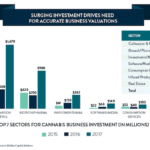Illinois Bank Shutting Out Cannabis Clients Over Sessions’ Stance

Canadians Find Comfort in Cannabis
May 6, 2018
Surging Investment Drives Need for Accurate Business Valuations
May 13, 2018Larry Mishkin, Hoban Law Group, Litigation Practice Group Counsel
The Bank of Springfield (Illinois) has notified its existing cannabis-related clients that their money is no good there anymore.
Citing what it terms a “legal gray zone” cast by U.S. Attorney General Jeff Sessions, the bank announced in an April 2 letter to customers that all accounts of its existing cannabis-related clients will be closed effective May 21, and no new accounts accepted. The bank based its decision on Sessions’ January decision to rescind the 2013 Cole Memorandum issued by then President Obama’s Justice Department. The directive had served as an assurance to states with medical cannabis programs that the prosecution of any state-licensed participants was not a federal priority, and it discouraged U.S. attorneys from pursuing such actions.
For affected businesses, the move represents a major setback and pressing concern given the lack of available banking options in Illinois. Medical cannabis retail sales there rang up a reported $8.5 million statewide in February, according to the Illinois Department of Public Health.
Pending any immediate alternative for banking, customers deprived of their accounts will be forced to revert to cumbersome and high-risk, cash-only financial activities characterized by the security risks of keeping large amounts of cash on hand, and meeting payroll obligations in straight currency. Given the current scarcity of other cannabis banking options in Illinois, such may soon be their working conditions.
The bank defended its action, asserting that servicing the cannabis industry would jeopardize the security of the bank’s non-cannabis customers. Other existing federal policies discouraging prosecution of actors in states with cannabis programs, such as Rohrabacher-Farr (restricting the DEA from using funds appropriated to it by Congress for such actions) did not, in the bankers’ assessment, provide “enough comfort” to continue to service Illinois’ medical cannabis industry.
The timing of the announcement is even more unfortunate since —notwithstanding some early struggles experienced by Illinois’ medical cannabis program (including a lower than expected patient count) —many see the program as having turned a corner in the last year-and-a-half with 1) the addition of PTSD and childhood epilepsy as qualifying medical conditions, and 2) the extension of the state pilot program’s “sunset date” by two and a half years to July 1, 2020. In addition, a bill to create an adult-use program in Illinois is currently pending in the state legislature, and Governor Bruce Rauner (an opponent of any expansion of the medical program and of adult use) faces a tough re-election challenge in November from J.B. Pritzker, who has publicly stated his support for both medical expansion (and permanence) and adult use.
In other words, the demand for cannabis banking services in Illinois is about to greatly expand at the same time the states’ banking options are becoming significantly more limited. While many would like to believe that a Pritzker victory in the fall would result in an expansion of Illinois’s cannabis banking services, given the bank’s federal concerns in deciding to close its cannabis accounts, such belief may be misplaced. The real solution requires a reversal of the new federal cannabis policy —which seems unlikely while Sessions remains in office.
Larry Mishkin is Counsel to Hoban Law Group and has nearly 30 years of experience that includes representing groups seeking marijuana dispensary and cultivation licenses in Illinois, as well as business interests ancillary to the medical marijuana market. Larry regularly consults with and counsels persons and groups looking for entry into the medical cannabis industry. He can be reached at larry@nullhoban.law.

Larry Mishkin
Larry Mishkin, Counsel, is a cannabis attorney specializing in state and federal litigation, appellate, and administrative matters including alternative dispute resolution (arbitration and mediation) options for Hoban Law Group. Founder and managing partner Robert Hoban of Hoban Law Group serves as an advisor to New Frontier Data.




